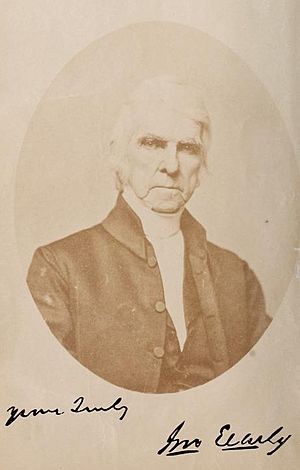John Early (bishop) facts for kids
Quick facts for kids
John Early
|
|
|---|---|
 |
|
| Born | January 1, 1786 Bedford County, Virginia, U.S.
|
| Died | November 5, 1873 Lynchburg, Virginia, U.S.
|
| Resting place | Spring Hill cemetery, Lynchburg, Virginia, U.S. |
| Education | Doctor of Divinity |
| Occupation | Clergyman |
| Known for | civic engagement, finance, publishing |
| Title | Bishop |
| Political party | Whig |
| Spouse(s) | Ann Winnifred Jones Elizabeth Browne Rives |
| Relatives | First cousin, twice removed from Jubal Early |
John Early (born January 1, 1786, died November 5, 1873) was an important leader in the Methodist Church. He helped create the Methodist Episcopal Church, South, and became one of its bishops in 1854.
Contents
Early Life and Family
John Early was born in 1786 in Bedford County, Virginia. His parents were Joshua and Mary Early. In 1815, he married Ann Winnifred Jones. After she passed away, he married Elizabeth Browne Rives in 1822. They had seven children together.
Becoming a Preacher
Even though his parents were Baptist, John Early became interested in Methodism around 1804. He was impressed by the powerful speeches of Methodist preachers at camp meetings. In 1806, he received a license to preach from the Virginia Annual Conference of the Methodist Episcopal Church.
He started his work by preaching to enslaved people on Thomas Jefferson's property, Poplar Forest. In 1809, he became a Deacon, a type of church leader, by Bishop Francis Asbury. He was ordained as an Elder in 1811. Reverend Early was known for helping many people convert to Methodism. In 1817, he began taking on more administrative roles within the church.
Community Involvement
John Early settled in Lynchburg, Virginia. In 1823, he helped start The Lynchburg Charity School. This was the town's first organized effort to provide public education.
He also became a Trustee for Randolph–Macon College when it was founded in 1830. He served as the President of the college's board for a very long time, until 1873. He helped with building the college and managing its business.
Early was also involved in banking and helped promote important projects in Virginia. These projects included roads, canals like the James River and Kanawha Canal, and railroads like the Virginia and Tennessee Railroad. In 1837, he became a founding trustee for the Female Collegiate Institute. This was one of the first colleges for women in Virginia.
Church Leadership and the Split
John Early was a very active leader in the Methodist Virginia Annual Conference. He served as secretary or presided over meetings almost every year from 1822 to 1850.
The Methodist Episcopal Church faced a big disagreement over slavery. In 1844, the church decided to split. Bishop John Early was part of the committee that created the plan for this separation. The following year, church leaders from slaveholding states formed the Methodist Episcopal Church, South. Early was elected to lead their first meeting.
He helped organize the new church and manage its money. He also represented the Southern church's publishing businesses as assets were divided after the split. This was settled by a ruling from the Supreme Court of the United States in 1855.
In 1854, Early became the Book Agent for the new denomination. He set up a large printing plant in Nashville, Tennessee. That same year, he was elected Bishop. As Bishop, he helped expand church missions to Native American reservations, plantation owners, Mexico, and China. He also helped print Bibles in many languages for these missions.
Civil War and Later Years
During the American Civil War, Bishop Early supported the Confederate States of America. He continued to lead church conferences during the war.
After the war ended, Bishop Early met with U.S. President Andrew Johnson. He worked to get back church properties that had been taken during the war.
In 1866, Bishop Early was injured in a railroad accident. However, he recovered and continued his work. He helped move Randolph-Macon College to Ashland, Virginia, and ensured it had staff and new funding. He also helped restore the church's printing plant in Nashville, which had been damaged during the war.
Death and Legacy
John Early passed away in 1873 in Lynchburg. He was buried in Spring Hill Cemetery in Lynchburg. He and his wife Elizabeth had donated land for this cemetery, and he had helped organize it in 1852.
Early is remembered for introducing "Standing Committees" to the Methodist Episcopal Church's General Conference. Because he lived so long, people saw him as a link to the early days of Methodism in America. He was known for his deep knowledge of church rules and history.
He also supported the establishment of the Lynchburg Water Works in the 1820s. A reservoir still exists on land he gave for the project. The Court Street United Methodist Church stands on a site where Early helped organize and finance a Methodist building in 1850.
Many of John Early's papers are kept at Randolph-Macon College. His diary from 1807-1814 has been published. Other documents are held in various institutions. A portrait of John Early, painted by John Blennerhassett Martin, is at the Virginia Historical Society.
See also
- List of bishops of the United Methodist Church
 | DeHart Hubbard |
 | Wilma Rudolph |
 | Jesse Owens |
 | Jackie Joyner-Kersee |
 | Major Taylor |

